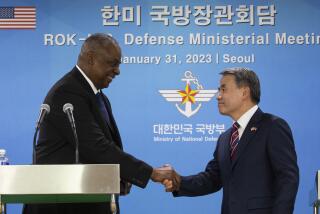Gates offers troops for joint combat efforts with Pakistan
- Share via
WASHINGTON — The U.S. military would be willing to undertake joint combat operations with Pakistani forces against Islamic militants if Pakistani leaders request the help, Defense Secretary Robert M. Gates said Thursday.
Gates’ remarks at a Pentagon briefing represented the first such public offer by a top Bush administration official since a change last year in Pakistan’s military leadership. It also reflects growing U.S. concern over the renewed militancy there.
Before Thursday, Pentagon officials avoided raising the possibility of combat operations with Pakistanis because of opposition by President Pervez Musharraf and the likelihood of widespread protests against U.S. involvement.
Asked about a widely reported proposal for expanding the U.S. military’s training activities in Pakistan, Gates said the Pentagon was willing to go further by conducting joint combat operations.
He said deploying U.S. troops in Pakistan to pursue Al Qaeda leaders was the “subject of ongoing dialogue” with officials there.
“We remain ready, willing and able to assist the Pakistanis and to partner with them, to provide additional training, to conduct joint operations, should they desire to do so,” Gates said.
Adm. William J. Fallon, the Pentagon’s commander for the Middle East, was in Pakistan this week to meet with senior officials. The chairman of the Joint Chiefs of Staff, Adm. Michael G. Mullen, said he did not know whether Fallon made any new proposals to the Pakistanis.
“I think certainly if there is a desire on the part of the Pakistani armed forces and the Pakistani government to have us assist, we would certainly try to do that,” said Mullen, appearing with Gates.
Gates said the assassination of former Prime Minister Benazir Bhutto had prompted the U.S. military to focus on the “considerable security challenge” posed by extremists in Pakistan.
The U.S. has 28,000 troops in Afghanistan, but those forces are not allowed to cross into Pakistan to pursue Taliban or Al Qaeda militants. Pakistan is a “sovereign country,” Gates said, and therefore the U.S. would not conduct combat operations within its borders without an agreement.
“They clearly have the right to decide whether or not forces from another country are going to operate on their soil,” he said. “We will continue the dialogue, but we would not do anything without their approval.”
Gates’ remarks were the latest sign of improving ties between the U.S. and Pakistani militaries since Gen. Ashfaq Kiani became Pakistan’s army chief of staff in November, when Musharraf relinquished the post under political pressure.
Kiani has taken steps to focus his forces on the threat posed by Islamic militants and is working with the U.S. military to improve his army’s counterinsurgency training.
Gates’ comments also may represent increased administration pressure on Pakistan to take the Pentagon up on its offer to conduct joint military activities or additional training operations. Gates said the U.S. and its allies are concerned about the reestablishment of Al Qaeda havens in the border region.
Last month, Gates noted that the Al Qaeda terrorist network had turned away from attacks against U.S. forces in Afghanistan and instead was concentrating on Pakistan. Expanding on those comments Thursday, he said Al Qaeda had been strengthened by its alliance with some of the tribes in the border area.
“Al Qaeda has threatened to try and destabilize Pakistan, has threatened to assassinate Pakistani leaders,” Gates said. “Some of this lacks real clarity. But they clearly are much more active and working with other people.”
Defense officials argue that Al Qaeda hopes to further destabilize the Pakistani government.
In addition, Al Qaeda militants do not believe the Pakistani army is capable of mounting decisive operations against them, U.S. analysts have argued.
American officials remain skeptical of the Pakistani army’s counterinsurgency abilities and want to find more ways to help the army become more effective.
Gates noted that any combat operation in Pakistan would involve a small number of troops in the mountainous border area.
“You’re not talking about significant numbers of U.S. troops . . . if you’re talking about going after Al Qaeda in the border area or something like that,” Gates said.
--
More to Read
Sign up for Essential California
The most important California stories and recommendations in your inbox every morning.
You may occasionally receive promotional content from the Los Angeles Times.










